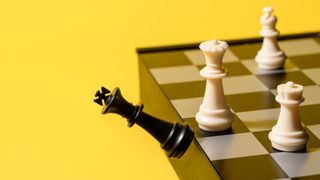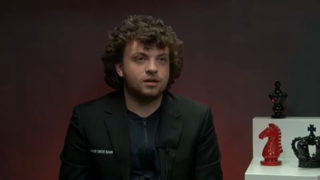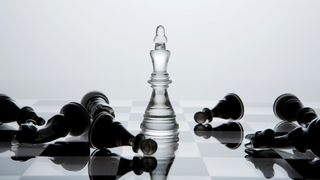Chess scandal re-ignites: Grandmaster accused of cheating in 'more than 100' games
World champion Magnus Carlsen has accused Hans Niemann of cheating to beat him.

Over the last month the game of kings has come under intense scrutiny thanks to accusations of cheating made by the world champion, Magnus Carlsen, against the grandmaster Hans Niemann. The whole thing began when the pair faced off in the third round of the Sinquefield Cup, a major chess tournament, an encounter that Niemann won as black. This was a major upset. Perhaps too major.
Shortly afterwards Carlsen withdrew from the tournament, and posted a clip of football manager Jose Mourinho saying "if I speak I am in big trouble." The implication, quickly made explicit by Carlsen's friend and former world #2 Hikaru Nakamura, was that Niemann had cheated. Niemann strenuously denied the charge, admitting that he had cheated twice as a youngster but saying he was now clean and has never cheated in an over-the-board game.
Carlsen faced criticism himself for the vague nature of the accusation (British grandmaster and former world title contender Nigel Short described it as "death by innuendo"), but then matters came to a head when the pair were drawn against each other in an online tournament. Carlsen made one move, resigned the game, and left. For the chess world champion to do this is shocking. Then, Carlsen came right out and said it:
"We must do something about cheating, and for my part going forward I don’t want to play against people that have cheated repeatedly in the past, because I don’t know what they are capable of doing in the future [...] So far I have only been able to speak with my actions, and those actions have stated clearly that I am not willing to play chess with Niemann."
The whole thing is a mess of accusations, denials, and arrant nonsense (such as the claim any cheating somehow involves vibrating anal beads). At the heart of it is Chess.com, which is distinct from the game's governing body FIDE, but is one of the largest chess platforms in the world and a major organising force. Following the blowup with Carlsen, it made an early decision to suspend Niemann, saying only that it had provided him with the proof as to why.
Now, it has published the evidence: and while there's no smoking gun about the Carlsen match, the general picture it paints is damning of Niemann. The report claims Niemann "likely cheated online much more than his public statements suggest. However, while Hans has had a record-setting and remarkable rise in rating and strength, in our view there is a lack of concrete statistical evidence that he cheated in his game with Magnus or in any other over-the-board ('OTB')—ie, in-person—games."
The full report can be read here. It goes into some depth, including long lists of matches and explains the statistical analysis applied to Niemann's games. Here we'll focus on the conclusions it draws and what it reveals about Niemann's past record.
The biggest gaming news, reviews and hardware deals
Keep up to date with the most important stories and the best deals, as picked by the PC Gamer team.

"Overall, we have found that [Niemann] has likely cheated in more than 100 online chess games, including several prize money events."
Chess.com
Hans off
The report clarifies that Chess.com was "never pressured by Magnus or his team whatsoever to remove Hans from Chess.com" and that Carlsen did not know about the organisation's decision until Niemann himself went public. It nevertheless says the decision was made to ban Niemann "based on our experience with him in the past, growing suspicions among top players and our team about his rapid rise of play, the strange circumstances and explanations of his win over Magnus, as well as Magnus’ unprecedented withdrawal."
Then, the line that flatly contradicts Niemann's earlier denials. "Hans admitted to cheating in chess games on our site as recently as 2020 after our cheating-detection software and team uncovered suspicious play." Facts like this, and suspicions raised by other top players, lay behind the site's subsequent actions and investigations.
"Consistent with the letter we sent Hans privately on September 8, 2022, we are prepared to show within this report that he, in fact, appears to have cheated against multiple opponents in Chess.com prize events (beyond the Titled Tuesday event that Hans admitted to having cheated in when he was 12), Speed Chess Championship Qualifiers, and the PRO Chess League. We also have evidence that he appears to have cheated in sets of rated games on Chess.com against highly-rated, well-known figures in the chess community, some of which he streamed online. These findings contradict Hans’ public statements."
Chess.com's internal team uses various methods of analysis to determine whether a player is cheating. A common example would be where a player's moves mirror what a top chess engine would do in the same situation ("every move is an engine move"), though of course players also cheat by, for example, using an engine only for one critical move.
The site says it "gathered detailed evidence [that] there were numerous games where Hans’ gameplay fell along this [cheating] spectrum, strongly suggesting that he violated our fair play regulations."
It provides a table of matches in which, it claims, Niemann appears to have cheated. "Overall, we have found that Hans has likely cheated in more than 100 online chess games, including several prize money events. He was already 17 when he likely cheated in some of these matches and games. He was also streaming in 25 of these games."
Whatever the truth about Niemann may be, he is an outstanding chess player. The problem is not that he may occasionally produce a game of dazzling sophistication, which one could reasonably expect from one of the world's best. It's that while his performance in some of these games "may seem to be within the realm of some statistical possibility, the probability of any single player performing this well across this many games is incredibly low."
As well as conducting machine analysis, Niemann's games were subject to manual review by chess analysts. This included an authority on cheat detection in chess, Ken Regan, who "expressed his belief that Hans cheated during the 2015 and 2017 Titled Tuesdays, as well as numerous matches against other professional players in 2020."
There's an account of a phone call between Niemann and the site's CCO, regarding his then-ban. "In 2020, during a private call with Danny Rensch, CCO at Chess.com, Hans was informed of his account closure for suspected cheating in these events and matches. During this call, Hans confessed to the cheating offenses. Following the call, Hans and Danny communicated over Slack, an internal real-time messaging system, where Hans asked how to acknowledge the cheating offense and how to affirm that it would not ever happen again. In that call, Danny agreed to support Hans’ desire to save face and announce publicly that he was voluntarily closing his account to start fresh."
This was what went on to happen, with Rensch satisfied that the site had both done the right thing in dealing with the cheating, and given a rising young player a second chance.

Endgame
"We want stability, fairness, and joy in the chess community, not turbulence, conspiracy, and accusations."
Chess.com
Chess.com would later reinstate Niemann before the last month's events. Now, one of the issues here is that Chess.com understandably specialises in detecting online cheating, not over-the-board games. It therefore avoids drawing firm conclusions about certain games it identifies, heavily implying that FIDE should be the ones to make any calls about them. This matters because "Outside his online play, Hans is the fastest rising top player in Classical OTB chess in modern history [...] While we do not doubt that Hans is a talented player, we note that his results are statistically extraordinary."
A lengthy statistical analysis of Niemann's over-the-board play follows, which nevertheless is not as impressive a record as some claim. A particularly prevalent charge is that Niemann had a streak of 'near-perfect' games that suggested engine use. "Hans actually has one of the lower percentages of 'near perfect games' when compared to similar players." It notes "oddities" in move choice and analysis but nothing that raises any "red flags".
As regards the first match between Carlsen and Niemann, the report notes Niemann's claim about preparing specifically for an opening line where Carlsen plays pawn g3 on his fourth move: “By some miracle," said Niemann, "I had checked this today and it’s like, it’s such a ridiculous miracle that I don’t even remember why I checked it."
The report notes that "Magnus has only played 4.g3 twice previously (both before 2010), and the position after Hans castled on move four had never been seen in any of Magnus’ games. Hans in a later interview commented that Magnus had previously played the opening against Wesley So in the 2018 London Chess Classic, but there is no such game on record." Curious stuff.
"In our view," the report reads, "this game and the surrounding behaviors and explanations are bizarre [...] However, we are currently unaware of any evidence that Hans cheated in this game, and we do not advocate for any conclusions regarding cheating being made based on this one encounter."
The authors describe Carlsen's accusation as "the loudest statement in chess history", and address suspicions that Chess.com somehow knew about Niemann's cheating over-the-board or was under pressure from Carlsen to act. "The much less interesting truth is that none of this is true." The site's intention was to settle the matter with Niemann privately, as is its custom in such situations, before the player went public.
The report refuses to draw firm conclusions about Niemann's over-the-board play, but is damning about his online record:
"Our investigation has concluded that [Niemann] did, however, cheat much more than he has publicly admitted to, including in many prize events, at least 25 streamed games, and 100+ rated games on Chess.com, as recently as when he was 17 years old."
The report ends: "We want the best for Hans. We want the best for Magnus. We want the best for chess. We want stability, fairness, and joy in the chess community, not turbulence, conspiracy, and accusations."
There's some fascinating material in the appendices, including the Chess.com security team's incredulity in 2020 when they first identify and accuse Niemann. After a few token efforts to deny what he was up to, the security team explain the kind of cheating they've identified (using engine moves sporadically at key moments) and… he admits to it. When he does, the team finds it "shocking" that such a strong player (a 2700 rating aka "a monster") is doing this, and speculate that he may be the highest-ranked player they've ever caught cheating.
There's also the sombre note of Dannny Rensch's letter to Nieman, which was intended to remain private correspondence before these events began to dominate the chess scene. Rensch patiently lays out the history between the organisation and Niemann, explaining the decision to revoke his account and not allow him to compete in tournaments, before ending with the offer of a phone call.
"If you are willing to correct the false statements you made about having never cheated when it mattered (now that you have said these untruths publicly), acknowledge the full breadth of the above violations, and cooperate with us to compete under strict Fair Play measures, Chess.com would be happy to consider bringing you back to our events," writes Rensch. "In fact, I think it would be a wonderful redemption story for the full truth to come out, for the chess world to see this and acknowledge your talent regardless of your past, and give the community what they deserve: The truth."
Rensch, the chess world, and everyone else may be waiting some time. Whatever the truth of the Carlsen match may be, the extent of Niemann's online cheating is clearly much wider than he ever admitted to: and it is not unreasonable to think that, if someone will cheat in one form of the game, then they'll be happy to do so in another.
The young challenger may well be able to say there's no proof he cheated against the world champion: but this report proves that, as Carlsen said in his accusation, he's cheated more widely than he ever admitted to. Niemann's future in the game must be in doubt and, thanks to this report, his denial and reputation are in tatters.
Rich is a games journalist with 15 years' experience, beginning his career on Edge magazine before working for a wide range of outlets, including Ars Technica, Eurogamer, GamesRadar+, Gamespot, the Guardian, IGN, the New Statesman, Polygon, and Vice. He was the editor of Kotaku UK, the UK arm of Kotaku, for three years before joining PC Gamer. He is the author of a Brief History of Video Games, a full history of the medium, which the Midwest Book Review described as "[a] must-read for serious minded game historians and curious video game connoisseurs alike."

If you love big trucks, establishing trade routes, and the phrase 'post-apocalyptic survival business simulator' then I've got just the strategy RPG for you

Blizzard veteran David Kim's strategy comeback with Battle Aces is 'very personal:' 'I just can't accept... the end-all peak of RTS is StarCraft 2 and nothing can ever be better'
Most Popular






